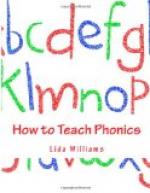1-8 8-1
child-dren), the children replying as they come, “We’re here.”
For individual tests let the mother call out all her children from the other families, the children coming to her as she calls their card names.
RHYME STORIES
Enliven the phonic drills occasionally by originating little rhymes, using the words of the series to be reviewed. Write the words on the board in columns, or upon cards. As the teacher repeats a line of the jingle, she pauses for the children to supply the rhyme words.
Grandma was taking a cozy
nap
Her hands were folded in her
(lap)
When she wakened she heard
a (tap)
In the maple tree that was
full of (sap.)
She soon spied the tapper—he
wore a red (cap)
White vest and black coat,
and his wings gave a (flap)
As he hopped about with a
rap-a-tap-(tap)
What did he want—was
he looking for (sap)?
Ah no, but for grubs, which
he ate quick as (snap)
Can you name this gay drummer
who wears a red (cap)?
II.
As soon as possible introduce a number of phonograms into the same story.
I have a little pet
Who is as black as (jet)
She sits upon a mat
And watches for a (rat.)
Her coat is smooth as silk,
She likes to drink sweet (milk)
She grows so fast and fat
That soon she’ll be
a (cat)
Can’t you guess?
Now what a pity
’Tis the dearest little
( ).
SPELLING BY SOUND
An easy step now, which the children will enjoy is the writing of the words of given families as a dictation exercise, followed by sentences as soon as the use of the capital and period have been taught. Such sentences as the following may be given after a number of short “a” phonograms are mastered:
The cat sat on a mat.
Nan has a fan.
The cat is fat.
The cat can see the pan.
The man has a hat.
Dan has a bat.
Dan has a hat and a cap.
The bag is in the cab.
When phonograms containing the other short vowels are known, words may be pronounced miscellaneously from different series or families; as, run, cap, pet, ran, pin, top, followed by sentences made up of miscellaneous words, as,—
“Run red hen.”
“Nan has a fan.”
“Get the hat pin.”
“Ned can spin a top.”
“Nat set the trap.”
“Jack run back and get
the sack.”
“A fat man got in the
hack.”
“Can Sam get the hat?”




